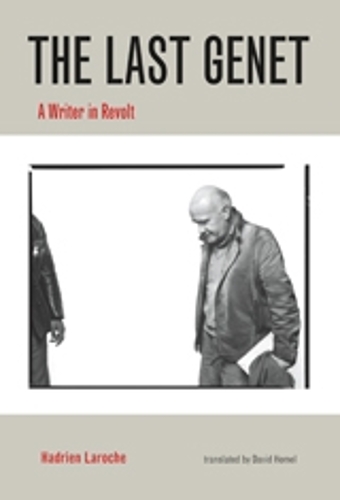
The Last Genet
(Paperback)
Publishing Details
The Last Genet
By (Author) Hadrien Laroche
Arsenal Pulp Press
Arsenal Pulp Press
21st October 2010
Canada
Classifications
General
Non Fiction
842.912
Physical Properties
Paperback
343
Width 154mm, Height 227mm
562g
Description
2010 is the 100th anniversary of Jean Genet's birth. The final decades (1968-1986) of his life were preoccupied with the struggles of the disenfranchised: the Black Panthers (an African-American revolutionary left-wing organisation working for the self-defence for black people), Baader-Meinhoff (a German communist and anti-imperialist 'urban guerrilla' group) and the Palestinians. Laroche provides a careful philosophical and historical reading of these groups and Genet's relation to them.
Reviews
This is a magnificent book that gives us the metamorphoses of the last Genet, the poet of the jouissance of evil saved from abjection by his sacred relation with the language of the sublime.
--Elisabeth Roudinesco
Genet's last journey, as revealed by Laroche, is imbued with beauty, metamorphosis and emancipation on one hand, and monstrosity, nihilism and hopelessness on the other. An indispensible study for readers interested in Genet, the Black Panthers, the Palestinian/Israeli conflict or, more generally, the philosophy of humanism.
--Kirkus Reviews
Highly recommended for readers interested in Genet and his works.
--Library Journal
Laroche's exhaustive research provides a historical framework for examining Jean Genet's later non-fiction work, particularly Prisoner of Love, and the ways in which his political ideals and experiences shaped his worldview.
--Publishers Weekly
Hadrien Laroche's eloquent, evocative meditation on mid-20th-century French writer Jean Genet focuses on the last and surprising phase of the life of an author remembered as a scandal-causing gay novelist, experimental playwright and defender of the oppressed ... Ably translated by David Homel, Laroche's book serves as a timely homage that marks the centenary of Genet's birth on December 19, 1910 ... Laroche writes in the tradition of the French essay, at once lyrical and densely analytic. It's a line of thought that runs from Montaigne through Camus and all the way up to Derrida. Laroche meditates on the images of the era (including that emblematic triumvirate of sex, drugs and rock 'n' roll), the oscillations of politics and violence, and on the last years of the paradoxical Genet, rebel and humanist.
--Stan Persky, The Globe and Mail
Author Bio
Hadrien Laroche: Hadrien Laroche was born in Paris; he completed his doctorate under Jacques Derrida in 1997 and has written three French-language novels. Derrida considered Larouche as "one of the most talented and original thinkers of his generation."
David Homel: David Homel was born and raised in Chicago in 1952. He has been a journalist, editor, literary translator, and teacher, and has won numerous awards for translation, including the Governor General's Award for Literature, Canada's highest literary honor.
